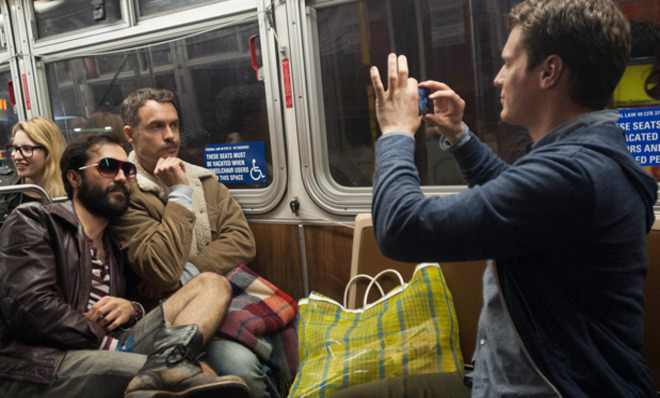Don't call HBO's Looking 'the gay Girls'
HBO's new dramedy has more than its fair share of unique charms

A free daily email with the biggest news stories of the day – and the best features from TheWeek.com
You are now subscribed
Your newsletter sign-up was successful
If you've read any stories about HBO's new series Looking, which premieres this Sunday, you've probably seen some version of this phrase: "It's the gay Girls." It's an undeniably pithy advertising pitch, and a simple way for critics and viewers to capture the show's vibe.
It's also unfairly dismissive of Looking's unique qualities. Yes, Looking and Girls are half-hour "comedies" on the same premium cable network. And yes, both feature young characters struggling with the tribulations of life, love, and career. But beyond that, the similarities between the two are fairly superficial. Indeed, Lena Dunham's millennials are an altogether more aggressive, self-aggrandizing bunch, while Looking boasts a refreshing sense of optimism that bursts through alongside its candor.
That's not a knock on Girls; there's no denying the shrewd accuracy of Dunham's observational humor, even if the egocentrism of Girls' characters can prove exhausting. Don't we all know at least one narcissistic 20-something who wholeheartedly believes that her First World problems eclipse the totality of human suffering?
The Week
Escape your echo chamber. Get the facts behind the news, plus analysis from multiple perspectives.

Sign up for The Week's Free Newsletters
From our morning news briefing to a weekly Good News Newsletter, get the best of The Week delivered directly to your inbox.
From our morning news briefing to a weekly Good News Newsletter, get the best of The Week delivered directly to your inbox.
Looking tells an entirely different story. Patrick (Jonathan Groff), Looking's protagonist, is unabashedly earnest, a romantic who is both too idealistic and picky to give any relationship a real chance. His best friend Agustin (Frankie J. Alvarez) is in a committed relationship, but he feels stifled by his boyfriend Frank (O.T. Fagbenle), and flees the perils of intimacy to go through the motions of being hot, young, and gay in San Francisco. The oldest of the bunch, Dom (Murray Bartlett), wholeheartedly embraces these clichéd promiscuities, hooking up with every pretty young thing that crosses his path to prove that he can — all to mask how deeply a previous partner hurt him.
There are still precious few shows that are positioned from the perspective of homosexual characters (although gay men fare better than lesbians, bisexuals, and transgender individuals in this respect). The small number of shows that do make it to air often trade on preachy grandstanding or shopworn stereotypes (see Sean Saves the World, Modern Family, The New Normal). Looking is undeniably a series that aims to represent a real gay male experience.
But it's also one of the only recent shows with gay protagonists that doesn't treat its characters' orientation as their only personality trait.
Like Dunham's Hannah, Groff's Patrick is prone to over-analyzing his interactions with other humans, and is just as likely to say or do something mortifying over the course of normal conversation. But while Girls keeps driving that Q-tip deeper and deeper until it's almost too agonizing to watch, Looking treats its characters as people, not cautionary tales.
A free daily email with the biggest news stories of the day – and the best features from TheWeek.com
Patrick, Agustin, and Dom have partners of various ethnicities, ages, and social groups. They discuss politics or social issues in passing, just like the rest of us. They don't exist to teach us lessons or preach about gay rights, nor to incessantly navel-gaze about their problems. They're just three regular guys who happen to like guys. In 2014, that's (sadly) still remarkable.
As a straight, 25-year-old woman, it's telling that I find a show about three gay guys more relatable than one about four 20-something women. Perhaps some viewers have a higher tolerance for Girls' cringe-inducing exploits, but there's a universality to Looking's various perspectives on love that's refreshing. The show explores this world without reducing its characters to stock types, like the Sex and the City–style categorizations that Girls itself once satirized.
Once again, HBO proves that there's plenty of room for all kinds of guys and girls on our screens — and that lazily conflating them only means that you'll be less attuned to what makes each of them truly unique.
Laura Prudom is a freelance entertainment reporter, formerly of The Huffington Post, whose work has appeared on TV Fanatic, Moviefone, Vulture, and in the pages of Signature LA Direct magazine. A devourer of all things geek, she'll happily bore you with talk of Star Wars, Batman, and the underrated masterpiece that is Flash Gordon.
-
 The environmental cost of GLP-1s
The environmental cost of GLP-1sThe explainer Producing the drugs is a dirty process
-
 Greenland’s capital becomes ground zero for the country’s diplomatic straits
Greenland’s capital becomes ground zero for the country’s diplomatic straitsIN THE SPOTLIGHT A flurry of new consular activity in Nuuk shows how important Greenland has become to Europeans’ anxiety about American imperialism
-
 ‘This is something that happens all too often’
‘This is something that happens all too often’Instant Opinion Opinion, comment and editorials of the day